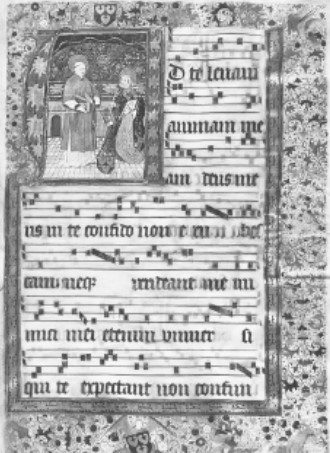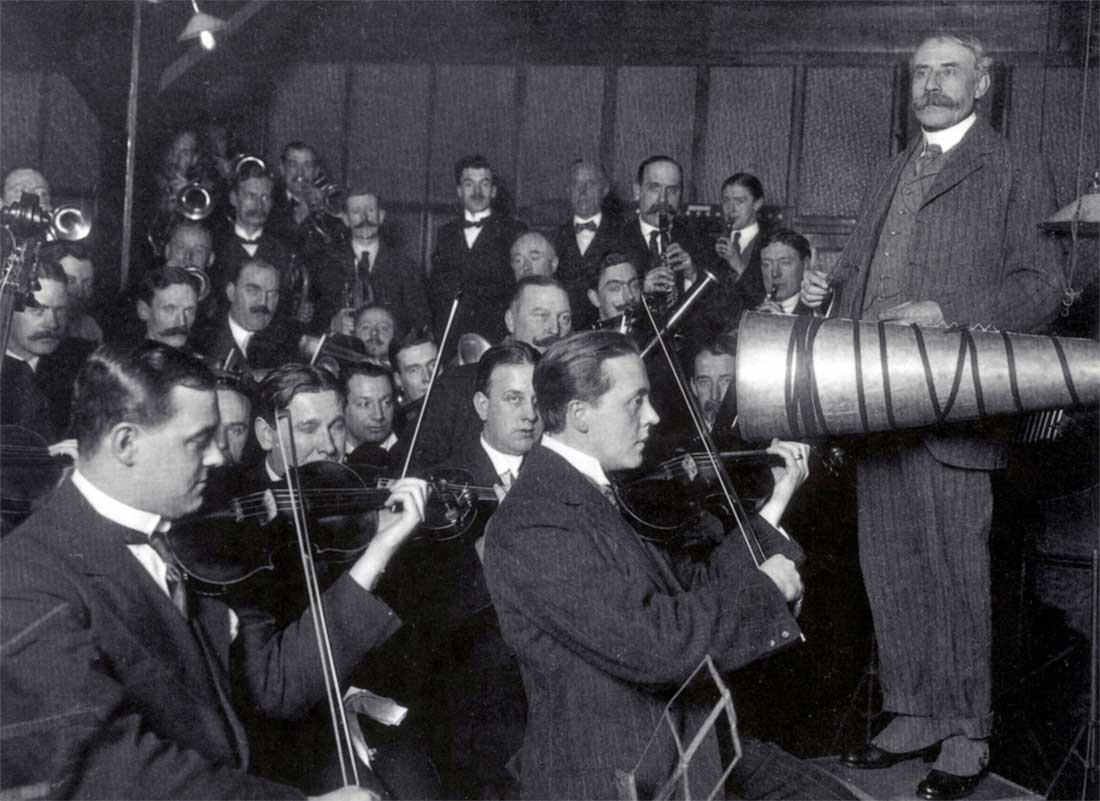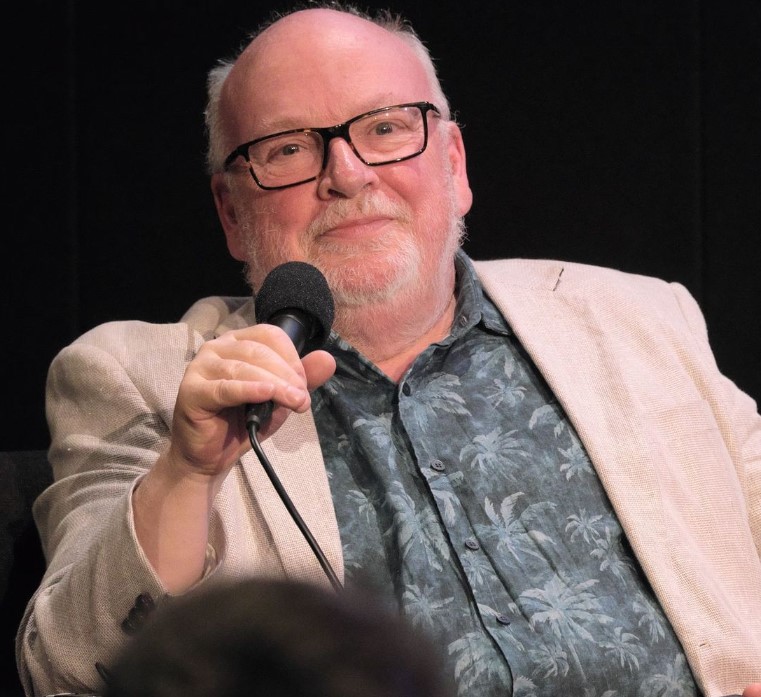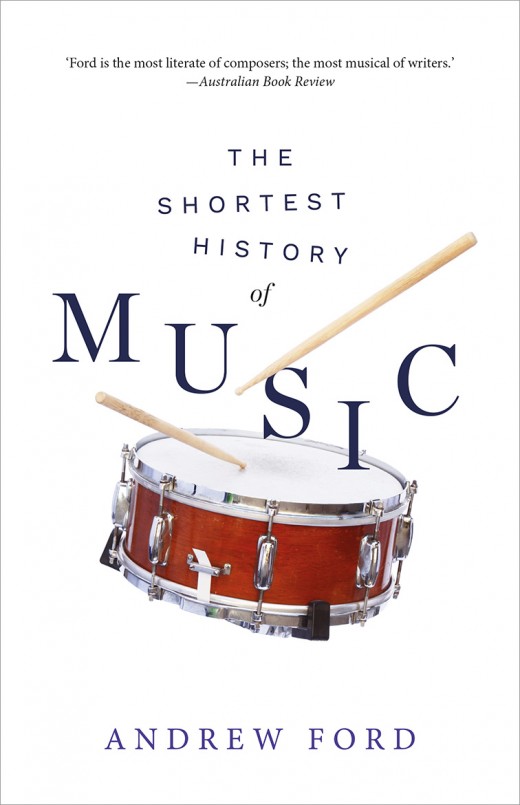In this episode of Biographers in Conversation, the multi-award-winning broadcaster, composer and author Andrew Ford OAM chats with Dr Gabriella Kelly-Davies about his latest book, The Shortest History of Music. A lively, entertaining, authoritative tour through 4,000 years of music, this book explores music’s role in human society. Spanning cultures and eras, it’s a blend of witty and informative anecdotes, historical insights and philosophical musings.
How Did Andrew Ford Condense 4,000 years of musical history into 200 pages?
The Shortest History of Music
The Shortest History of Music could be viewed as an object biography, the life story of an object, its history and relationships. Packed with colourful characters and surprising details, the book sets out to understand what exactly music is – and why humans are irresistibly drawn to making it.
Rather than structuring the book chronologically and trying to present an exhaustive history of music, Andrew Ford examined music from multiple angles: its fundamental impulses, the impact of notation, music as a profession and commodity, the concept of modernism and the revolutionary effects of recording technology.
Despite The Shortest History of Music being a brief book, Andrew compared, contrasted and contextualised the many forms of structure and sounds that music and song are made from, balancing brevity and intellectual depth. Remarkably, he synthesised a multiplicity of musical traditions and cultures into a seamless narrative.

A gradual, c. 1469.
Bodleian Library, University of Oxford
The Shortest History of Music is a sparkling account of what music has meant at various times and in different places. In it, Andrew Ford celebrates the music ‘happening all around us all the time’, whether notated, instrumental, oral, spontaneous, rehearsed or recorded. He takes us on a journey from prehistory to now, sharing the story of why music is as intrinsic to human life as the air we breathe. The Shortest History of Music is the fascinating story of why music is vital to the human experience.

Edward Elgar Making a Recording with the London Symphony Orchestra in 1914
New York Public Library/ Science Photo Library
Andrew Ford’s ability to distil 4,000 years of musical evolution into a concise, captivating narrative is a testament to his immense understanding and passion for music. His skilful weaving together of history, culture and personal insight creates a tapestry that celebrates music in all its forms. The Shortest History of Music is essential reading for anyone fascinated by the power and beauty of music.
Praise For The Shortest History of Music
Like an experienced jazz player, Andrew Ford knows how to swing his narrative, with delightful off-road lurches into unexpected or cheeky byways, or skilfully pivoting around events of a certain date (such as from Arnold Schoenberg’s twelve-tone modernism to big-band swing, in the 1930s) to stress chronological coincidence.
Ford celebrates the music ‘happening all around us all the time’, whether notated, instrumental, or oral, spontaneous or rehearsed, in infancy or old age, and recorded or just ‘vibrating in the memory’ (Shelley). With his Music Show background in music’s diversity, where he has now conducted more than six thousand interviews, Ford is unafraid to speculate on a truly global scale – ‘It is probably true to say that West African rhythms and styles have had a greater effect on the world’s music than those of any other region’ – or to explain that ‘most of the world’s musical styles and forms are to some degree syncretic, and that instruments have travelled the globe’.
Other important themes are woven, often subliminally, into the fabric of his text, such as the tension between valuations of progress, originality, and popularity in music’s varied reception, and his crisp rejection of the view that music is a ‘universal language’, unveiled in his first chapter’s first paragraph. He even reminds us later in the book of the no-music injunction of the Taliban, and its origins.
Malcolm Gillies
Australian Book Review
Ford’s non-linear storytelling weaves a multicoloured web of musical history.
Rather than adhering to a traditional chronological narrative, this latest eminently readable volume in Black Inc.’s Shortest History series presents a thematic exploration of music’s role in human society, spanning cultures and eras with an informative and entertaining blend of anecdotes, historical insights, and philosophical musings.
It also stands out for its inclusivity, challenging the Western-centric view that has long dominated music history, with Ford deftly uniting stories from diverse musical instruments, traditions and methods of transmission. These range from Australian Aboriginal oral traditions to notated classical compositions, as well as improvised jazz, pop, folk and modern recording techniques.
Such an approach underscores the universality of music while highlighting its diversity. So, while there’s Hildegard of Bingen, Monteverdi, Bach, Haydn, Beethoven, Debussy, Schoenberg et al., there’s also Ornette Coleman, Billie Holiday, Blind Boy Fuller, Isang Yun, Glenn Miller, Tupac Shakur, The Beach Boys and others.
Will Yeoman
Limelight
Exhilarating […] evokes a world of creative destruction where rules were made, broken and remade […] Note to prospective readers: stop and listen to any piece that is mentioned more than once. It will deepen the experience profoundly … The Shortest History of Music is an achievement in brevity and balance.
Kurt Johnson
The Saturday Paper
The Shortest History of Music by Andrew Ford demonstrates why music is so critical to understanding the human condition.
Samuel Bernard
Weekend Australian
In the latest in the admirable Shortest History series [Andrew Ford] considers the impulse to make music, notated music, music as a commodity, modernism and music, and the consequences of recording. All that in about 250 pages.
Jason Steger
Sydney Morning Herald
It may be a miniature, but this story of music strikes the right note […] The book’s chief delight is its constant asides, tangents and anecdotes, which appear on almost every page.
Barney Zwartz
The Age
It is impossible to convey enough of the substance and value of this small treasure. It would be accessible to all regardless of their musical taste and knowledge. A pleasure to read, Ford’s book celebrates a form created by humans with infinite possibilities, and in myriad ways has had the ability to add a unique richness to life from the dawn of history ….
Patricia Simms-Reeve
Queensland Reviewers Collective
Andrew Ford is a brilliant guide to the inner sanctums of composition and the outer reaches of what we can even call music … The Shortest History of Music is for every music lover.
B.P. Marshall
Tasmanian Times
Andrew Ford, as his many readers and listeners will know, is a person of great and varied knowledge, but one who wears his considerable learning lightly, and is thus able to be both brief and witty, without being shallow or offhand – no mean feat when writing the history of an activity so fundamental to and seemingly coexistent with the whole of human existence. A short book that invites us to explore a vast and varied musical universe.
Gordon Kerry
Loud Mouth
Ford’s emphasis on domestic music and everyday musical experiences is . . . of great interest. By considering not just famous composers and works, but also the music of ordinary people, he paints a fuller picture of music’s role in human life. As he poignantly observes: ‘That is, after all, how music started and how it will start again tomorrow.’
The epilogue nicely encapsulates the book’s themes, touching on the mystery and power of music. Ford’s reflection on the universality of the musical impulse is particularly moving, as he notes how even the most ‘avowedly unmusical among us’ cannot resist making sound when presented with an instrument.
Will Yeoman
Limelight UK edition (Old Street Publishing)
Brilliantly readable and bursting with insight, wit and wisdom. Ford is a master storyteller.
Michael Spitzer
Author of The Musical Human
A wonderful read […] as erudite as it is enjoyable; as riveting as it is revelatory. Andrew Ford’s history of music may be short, but it is deep. With the lightest of touches, he has excavated many layers of human history and global culture […] A highly readable (and persuasive) thesis of what music is, why it exists and how we couldn’t survive without it. Indispensable.
Clemency Burton-Hill
BBC broadcaster, writer and musician
The Shortest History of Music Interviews
The Shortest History of Music | ABC Conversations Podcast, ABC Australia
More than cheesecake — humanity’s shared musical history, ‘Conversations with Richard Fidler’, Australian Broadcasting Corporation
Composer Andrew Ford on The Shortest History of Music, ‘Nine to Noon’, RNZ
‘Meet The Author’, Andrew Ford in Conversation with Malcolm Gillies, Australian National University.

Andrew Ford OAM is a composer, writer and broadcaster who has won awards in each of those capacities, including the Paul Lowin Prize for his song cycle Learning to Howl, a Green Room Award for his opera Rembrandt’s Wife and the Albert H Maggs Prize for his large ensemble piece, Rauha.
Andrew has been composer-in-residence for the Australian Chamber Orchestra, the Australian National Academy of Music (ANAM) and the Australian Festival of Chamber Music. In 2014, he was Poynter Fellow and visiting composer at Yale University, and in 2015, he was visiting lecturer at Shanghai Conservatory of Music. In 2018, he was HC Coombs Creative Arts Fellow at the Australian National University.
Andrew Ford has written widely on all manner of music and published eleven books, most recently The Shortest History of Music (Black Inc., July 2024). He has written, presented and co-produced five radio series for the ABC and, since 1995, presented The Music Show each weekend on Radio National. He was awarded an OAM in the 2016 Queen’s Birthday Honours.




